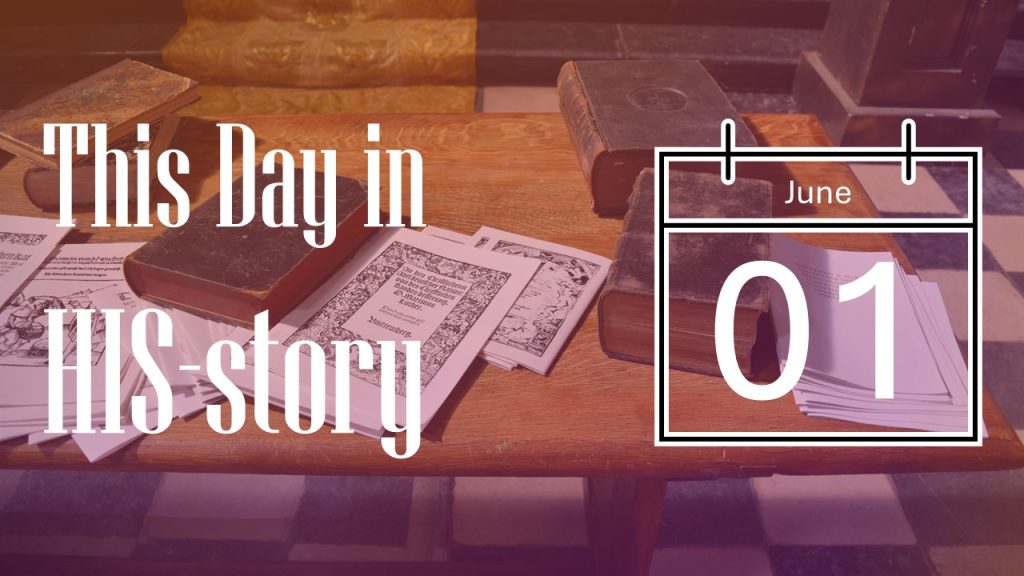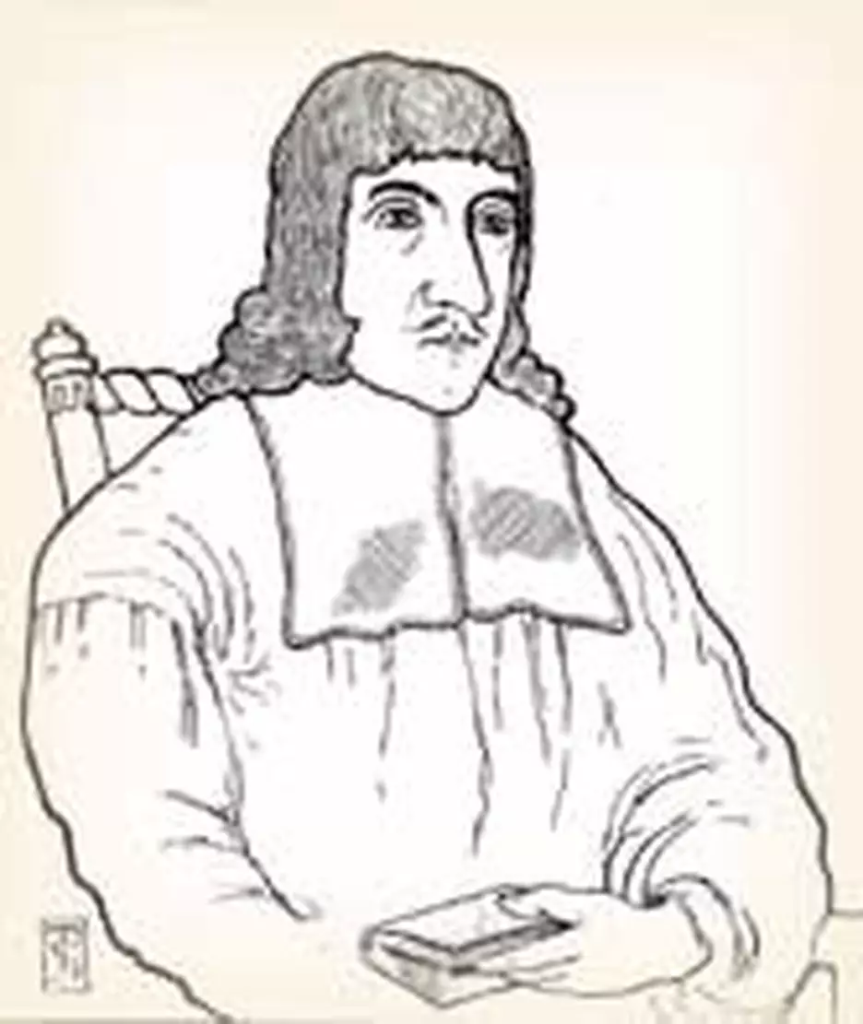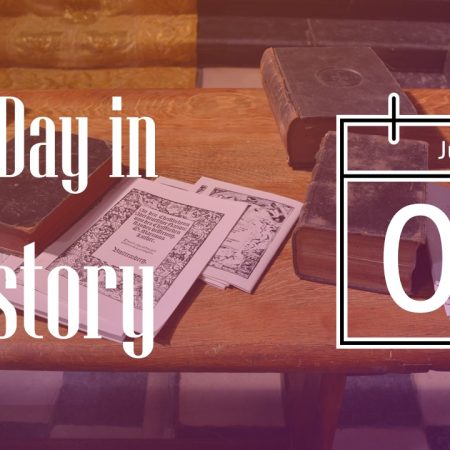
1661
At the close of his defense to the Scottish Parliament, James Guthrie said, “…My conscience I cannot submit to you. But this old crazy body and mortal flesh I do submit, to do with it whatsoever you will, whether by death, or banishment, or imprisonment, or anything else; only I beg you to ponder well what profit there is in my blood. It is not by killing me or many others that you will kill the Covenant or the work of the Reformation…” [language modernized]

However, his enemies were determined to execute him. On May 28, 1661, the order went forth: James Guthrie was “to be hanged at the cross of Edinburgh, on the first of June, and Mr. Guthrie’s head to be fixed on the Nether-bow, his estate to be confiscated, and his [coat of] arms torn…” The Scottish Presbyterian minister was to be executed for publishing a work which declared God’s wrath was coming upon Scotland for, among other things, setting up the King of England as head of the church. Only Christ could fill that role.
James was well-born and well-educated. At school, he met the godly and profound pastor named Samuel Rutherford, attended non-conformist prayer meetings, and was converted to Christ. After that, he became a zealous preacher of the gospel, but at the same time the kind of steady man who cannot be drawn into hot arguments.
Although he led a busy life as pastor and writer, he always made time for Christ. It was the same on the day of his execution. He got up at four in the morning so that he could meditate and pray. When his children visited him for the last time, he assured them that he died for a worthy cause.
James went to the scaffold on this day, June 1, 1661. There he preached his last sermon. “… I do believe that Jesus Christ came into the World to save sinners of whom I am the chief, through faith in his righteousness and blood, have I obtained mercy, and in him and through him alone have I the hope of a blessed conquest and victory over sin and Satan, and hell and death, and that I shall attain unto the Resurrection of the just and be made a partaker of eternal life; I know whom I have believed, and he is able to keep that which I have committed to him against that day.” He urged his listeners to seek Christ’s free grace.
The dying man gave a copy of this last speech to a friend to keep, asking him to pass it on to his little boy when he was old enough to understand what it meant. Then the napkin was put over his face and shortly afterward, James swung into space. Just as ordered, his head was placed on a pike over the gate. There the skull bore its testimony for 27 years, until a daring student risked his life to climb up, take it down, and bury it.
1794
“Run, Billy.” Deep inside the tin mine, instinct screamed at Billy Bray. He dropped his work and fled. Moments later, forty tons of roof collapsed on the very spot where he had been standing.
Inwardly Billy shook with terror. He knew as surely as he was standing there alive that if the mine had collapsed on him, he would have gone straight to hell. For although Billy was raised in a Methodist home, he had turned to alcohol and become one of the wickedest workers in the mine. Born on this day, June 1, 1794, at Twelveheads in Cornwall, England, he had the makings of greatness. He was lively, energetic, good humored, full of spirit and courage: always the life of the party. But inside he was filled with terror.

“I used to dread to go to sleep for fear of waking up in hell; and though I made many promises to the Lord to be better, I was soon as bad or worse than ever,” he said. His escape from the collapsing mine had a great effect on him.
A friend gave Billy a John Bunyan book: Visions of Heaven and Hell. Billy was impressed by the glory of heaven and wanted to be part of it. Then he read how in hell those who were friends on earth would blame one another for not turning each other away from sin. Billy had a close friend that he drank with. The thought of the two of them accusing each other for all eternity troubled him.
Billy’s wife had known the Lord as a child but drifted away. One night Billy had a talk with her. She remembered with bitter regret how wonderful it was to serve the Lord. “Why don’t you begin again?” asked Billy. He said he might become a Christian if she would return to Christ. That night he went to bed, knowing he should pray. But he was ashamed to do so in front of her.
At three in the morning he awoke. He realized suddenly that if he waited for his wife to get right with God, he might die without salvation. Then and there he got down on his knees and prayed for mercy. The next day was payday. For the first time in years, he came home sober. He spent hours reading the Bible and praying, crying out for salvation. He took a day off work to seek God.
Finally, days later, he prayed to God, “You have said, ‘Those that ask shall receive, those that seek shall find, and to them that knock the door shall be opened,’ and I have faith to believe it.” In that instant the Lord made him so happy that he could not express what he felt. Billy shouted for joy and did not stop until the day he died. Within a week of his conversion his wife made peace with Christ, too.
To the end of his life, Billy sang out loud, danced as he walked and shouted praise to the Lord. Some Christians felt this was improper behavior. But Billy kept on. In November 1823 he began telling others about the Jesus who had brought such joy to his life.
There was at that time an association of Methodists known as the Bible Christians because of their habit of carrying Bibles under their arms. Billy joined them. At the end of 1824, he became a local preacher. His sincerity and good humor made him a welcome speaker. When it was announced he was to preach, the chapel would be crammed. His greatest work was with fellow miners.
